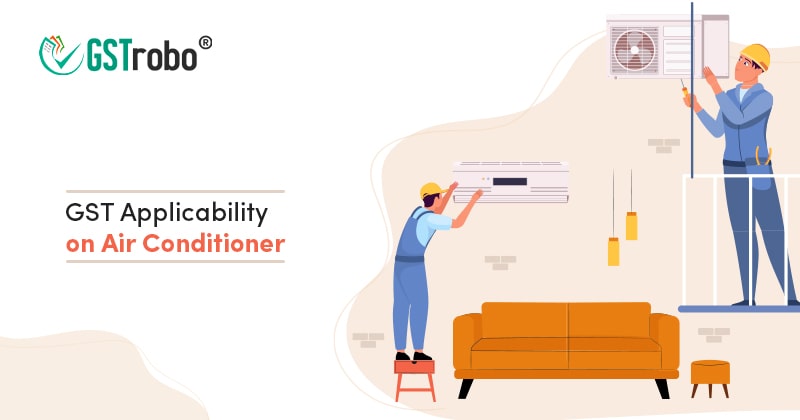GST Applicability on Air Conditioner
With the advent of GST, the tax rates on most electronic items were cut, except air conditioners and large-screen televisions, which now fall under the 28% tax bracket.

Applicability of GST on Air Conditioner
Almost all electrical items, including air conditioners, are subject to GST. GST has four primary tax rates: 5%, 12 %, 18%, and 28 percent. Essential commodities are subject to a 5% GST. The usual rates are 12% and 18%, respectively. Luxury items are taxed at a rate of 28%. Because air conditioners are considered luxury items, they are taxed at a rate of 28%. However, when the environment changes and the temperature rises, air conditioners are no longer considered a luxury purchase. It has now become a need.
What impact did GST have on the pricing of air conditioners?
Previously, consumer durables were subject to two significant taxes: VAT and excise duty. The total rate was between 23% and 27% (depending on the state). Air conditioners are subject to a 28% GST. Consumers will bear the brunt of the higher tax burden borne by businesses. This has resulted in a 1%–5% rise in the price of air conditioners.
What is the GST value of supply for air conditioners?
The act of supplying anything is considered a taxable event under GST. All types of supply of goods or services or both such as sale, transfer, barter, exchange, license, rental, lease, or disposal, are included in the supply.
Supply value = Transaction value
The price paid/payable for the supply of goods or services is the transaction value. In most circumstances, when air conditioners are sold, the air conditioner provider also provides installation services. As a result, in the regular course of business, both air conditioner supplies and installation are naturally combined and given together. As a result, it’s a composite supply. The principal supply of air conditioners and the costs of installation are naturally bundled. The value of a supply is equal to the sale value of the product plus the price charged for the installation.
GST rate and HSN code Applicable to Air Conditioners
The GST rate on air conditioners is 28%. They fall under Chapter 8415.
| HSN code | Description |
| 8415 | Air conditioning machines comprising motor-driven fans and elements for changing the temperature and humidity, including those machines in which the humidity cannot be separately regulated. |
| 841510 | Of a kind designed to be fixed to a window, wall, ceiling, or floor, self-contained or “split-system” |
| 841520 | Of a kind used for persons in motor vehicles |
| 841581 | Other – Incorporating a refrigerating unit and a valve for reversal of the cooling or heat cycle (reversible heat pumps) |
| 841582 | Other, incorporating a refrigerating unit |
| 841583 | Not incorporating a refrigerating unit |
ITC availability on air conditioners
Every GST-registered individual is entitled to an input tax credit (ITC) on purchases of goods and services used in the operation of their company. However, section 17(5) limits ITC on goods/services received by a taxable person for construction of an immovable property (other than plant or machinery) on his own account including when such goods or services or both are used in the course or furtherance of business.
Thus, ITC can be claimed on air conditioner units, being movable property. Further, the availability of ITC on centralized AC systems, ventilation, and cooling systems needs to be decided on the basis of whether they can be considered movable or as plant & machinery.
What impact does the GST have on air conditioner prices?
Consumer durables were subject to a VAT rate ranging from 12.5% to 14.5%, depending on the state in which the transaction occurred. Aside from that, a 12.5% excise duty and cess were imposed. Air conditioners were taxed at a maximum of 27% across the board. Air conditioners are subject to a 28% GST levy. The ultimate price of the product has increased as a result of the increase in the tax rate.
Conclusion
The fact that air conditioners are taxed at 28% means it is still regarded as a luxury item rather than a need. As a result of higher tax rates and rising inflation, the cost of air conditioners will rise. However, the biggest advantage is that manufacturers and dealers may now claim ITC on raw materials. As a result, the taxation cascade effect is eliminated.
